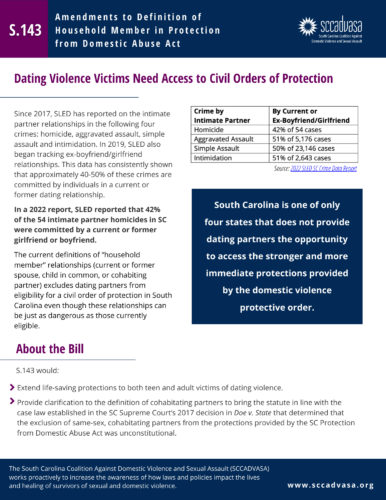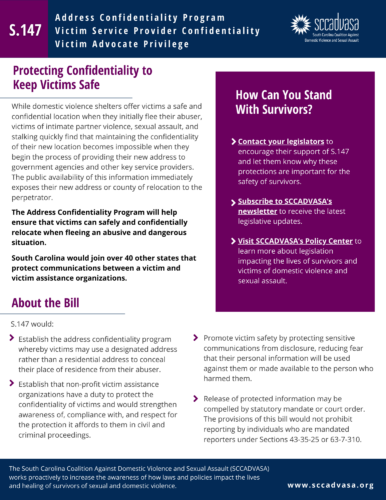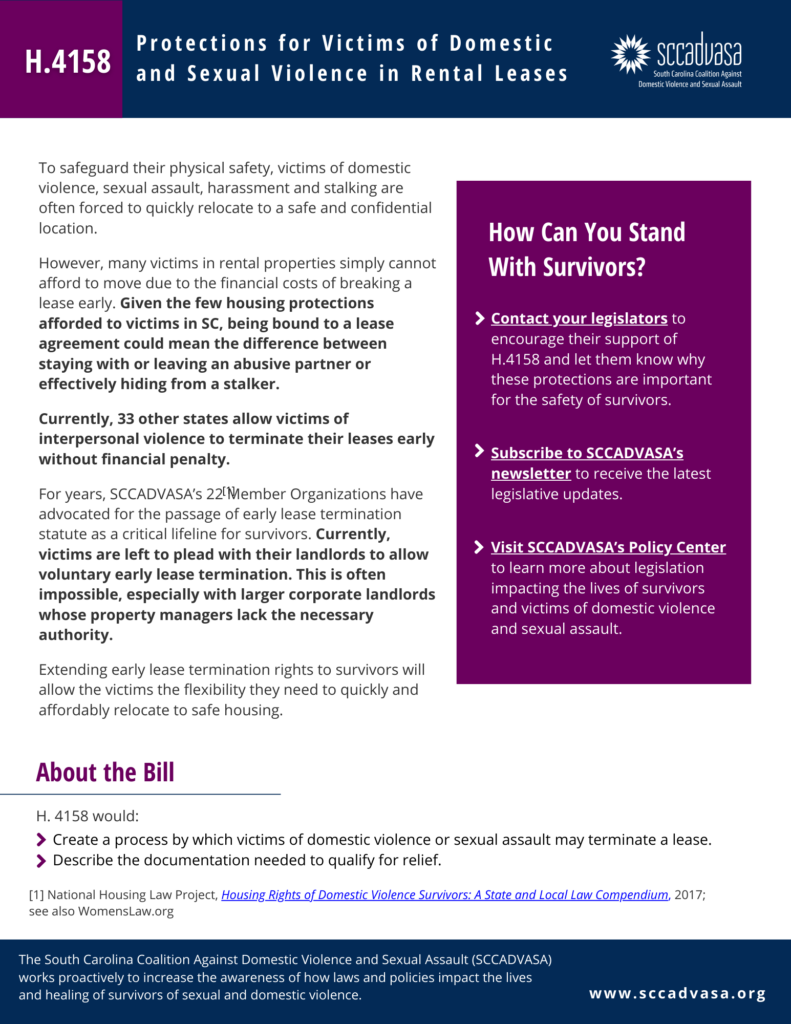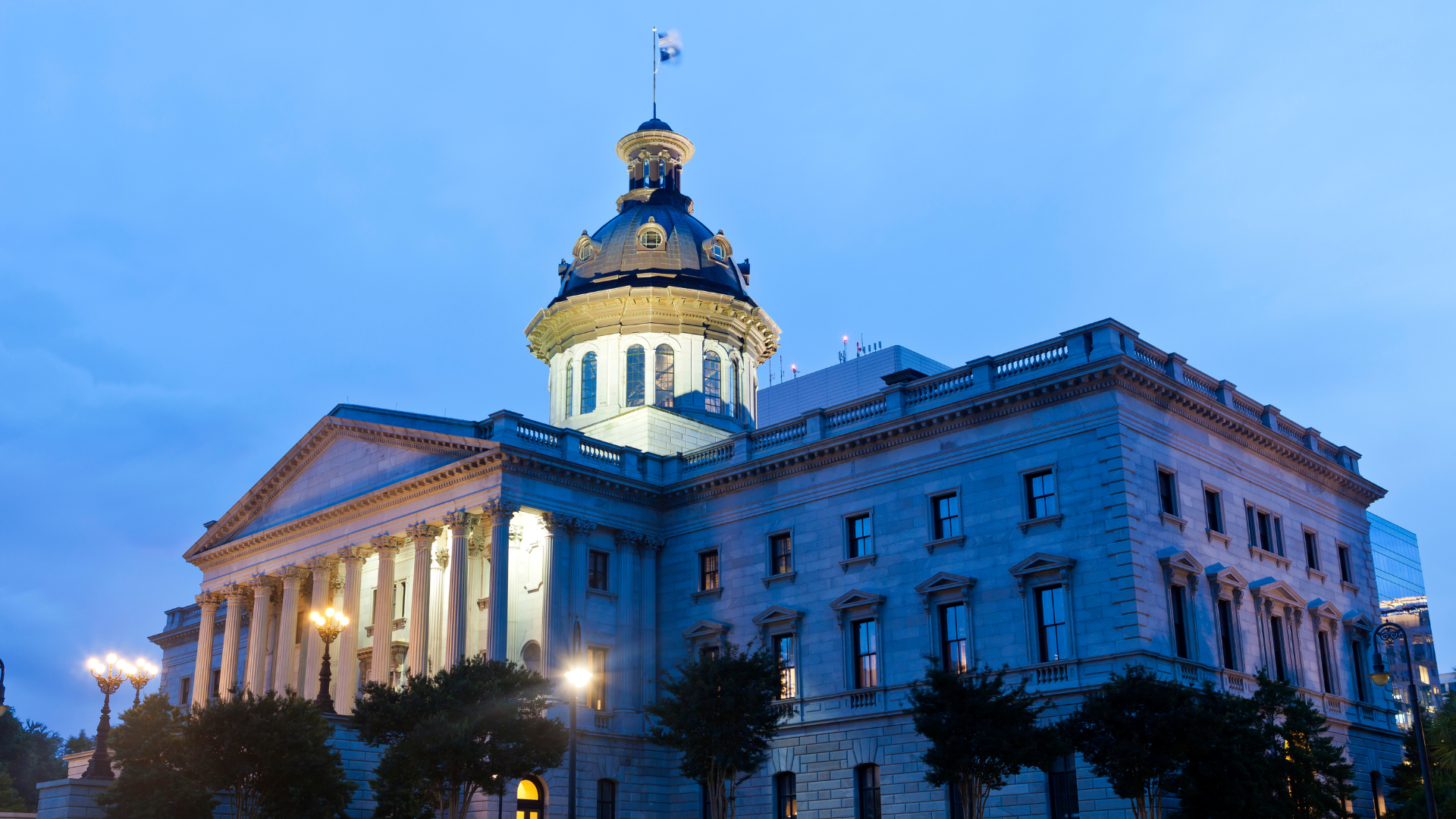Our policy focus areas are determined by our member organizations’ experience of emerging and ongoing needs at the community level. SCCADVASA strives to make sure these needs are heard, understood, and acted upon by our state legislators and congressional delegation.
With the start of the 2024 Legislative Sessions in both South Carolina and at the Federal Level, SCCADVASA will continue our advocacy efforts and monitor the situation at the S.C. State House and in Washington, D.C. We will provide updates on how things are progressing at both the State and Federal level in the “News & Updates” section of our website.
2023 SC State House Legislative Session Wrap UpState Updates
The second regular session of the 125th South Carolina legislature convened on January 9, 2024.
What does this mean for bills that have been filed? This session is the second year of a two-year session, meaning that all bills filed must pass through both chambers and be signed by the Governor by the end of the 2024 session.
If you are looking to gain a better understanding of the legislative process and hear more about our 2024 priorities, we encourage you to view the “South Carolina Legislative Process and 2024 Priorities” SCKnowMore webinar facilitated by our Executive Director Sara Barber on January 12, 2024.
Important Dates:
- April 10, 2024: Deadline for when a bill must have been passed by one chamber and referred to the other. For example, a bill that was introduced in the Senate must have been voted on and passed by the Senate and referred to the House for consideration by this date.
- May 9, 2024: Sine Die or the day on which the legislature adjourns for this year. Only legislation expressly identified in the Sine Die Resolution can be considered or acted upon beyond this date. Bills have until Sine Die to be signed into law.
SCCADVASA actively monitors all legislation that potentially impacts victims/survivors and our member organizations. This can range from specific bills that address the criminal legal and family court process to housing, to access to healthcare, to reproductive rights, and beyond.
The impacts of domestic and sexual violence have many intersections and reach far into the lives of survivors. The voices, needs and perspectives of survivors on policymaking, in every area of their lives, is critical to building safer homes and communities.
SCCADVASA’s Legislative Priorities for this year include:
S. 143 (Shealy & Goldfinch) Household Member & Dating Relationship This bill has passed out of Senate Judiciary and is currently awaiting debate on the Senate floor.
- Adds dating partners to qualifying relationships of Orders of Protection
- Also removes the “male & female” from the definition of cohabitating partners to conform with Doe v. State (2017)
Select the image below to learn more about S.143:

S. 147 (Shealy, Gustafson, Senn & Goldfinch) Address Confidentiality & Advocate Privilege This bill has passed the Senate and has been referred to the House Judiciary Committee.
- Creates confidentiality privilege for communications between non-profit DV & SA advocates and victims
- Creates a state VAWA-like confidentiality requirement for DV & SA non-profit organizations
- Creates an address confidentiality program within the Office of the SC Attorney General which would forward first class mail to survivors of domestic violence, trafficking, stalking, harassment & sexual offenses who qualify for participation
Select the image below to learn more about S.147:

S. 127 (Hembree) Firearms
- Amends the gun laws to acknowledge that some categories of people should not be able to lawfully purchase a firearm
- Included are those subject to court orders restraining the person from “harassing, stalking or threatening a household member…or the child of a household member” if they have been found to pose a “credible threat.”
H. 4158 (Pendarvis and M.M. Smith) Protections for victims of domestic and sexual violence in rental leases
- Creates a process by which victims of domestic violence or sexual assault may terminate a lease.
- Describes the documentation needed to qualify for relief.
Select the image below to learn more about H. 4158:



